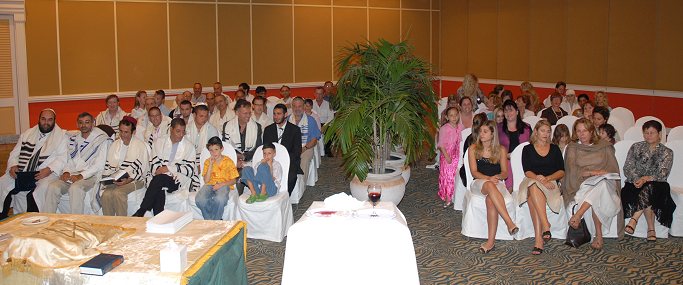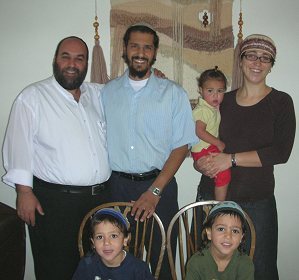Contrasting Yom Kippur services in Mauritius and Bulawayo 2007 – 5768
Both Africa’s youngest and one of its oldest Jewish communities observed Yom Kippur this year. For the Jews of Mauritius and Bulawayo, however, the holiest day on the Jewish calendar could not have taken place in more contrasting circumstances.
For one community, life is comfortable and secure and for both the Jewish community and the country as a whole, the future looks bright. For the other it is a time of crisis, with mere day to day survival being the only realistic goal that can currently be aspired to. Mauritian Jewry mainly comprises younger people while the median age in Bulawayo is well over seventy.
This was the first time in sixty years that full Yom Kippur services were taking place in Mauritius. The last occasion was during World War II, when over 1500 Jewish refugees from Nazi-held Europe were being interned on the island by the British authorities. Over seventy people attended the services at Sugar Beach Resort, which were presided over by Rabbi Moshe Silberhaft, Spiritual Leader to the African Jewish Congress, assisted by his son, Yossi, and Yosef Shishler. Rabbi Silberhaft also brought with him two sifrei Torah, machzorim and kosher food for the communal breaking of the fast.
During his visit, Rabbi Silberhaft also visited two Jewish prisoners in Beau Bassin prison who had been convicted of drug trafficking. Ironically, Beau Bassin was where the Jewish detainees were held during the war.
It was only this year that the Jewish community of Mauritius was formally constituted. For the time being at least, it will go by the name of the Island Hebrew Congregation as the name ‘Mauritius’ can only be used once permission has been obtained from the Prime Minister’s office. Such permission has now been sought.
Office bearers include Owen Griffiths (president), Andrew Slome (vice-president), Max Emile Boulle (treasurer), S. (Baby) Curpen (assistant treasurer), Linda Mamet (secretary) and Diane Reid (assistant secretary), with Rabbi Silberhaft as Spiritual Leader. Communal activities will revolve around major and minor Jewish festivals and Rabbi Silberhaft’s regular visits.
For Rosh Hashanah Rabbi Silberhaft, again accompanied by Yossi Silberhaft and Rael Olwyn, was in Bulawayo, the purpose being to bring kosher meat and other commodities as well as to generally show solidarity with the embattled community. No power or water greeted their arrival, a situation that prevailed throughout most of their stay. First night shul services took place in the dark, barring the odd emergency light, and only starlight alleviated the virtual pitch darkness of the subsequent four-kilometre walk from shul to one of the remaining kosher homes, that of Alan and Ruth Feigenbaum. Some 75 people attended the services, which were held in the Sinai Hall. The historic Bulawayo synagogue, founded in 1894, was destroyed by fire in 2003.
The Bulawayo Jewish community today comprises some 110 individuals, of which 23 are at the Jewish aged home Savyon Lodge. Despite its small and ever-diminishing numbers, its members remain committed to keeping the city’s 113-year-old Jewish congregation running. To this end, they recently engaged a new rabbi, Rabbi David Alima, who arrived from Israel two weeks before Rosh Hashanah with his wife Efrat and children Oriel, Yochai and Noa. The latter are amongst the very few Jewish children remaining in Zimbabwe.
Rabbi Silberhaft warned against Jews in South Africa taking a “charity begins at home” attitude towards the Zimbabwe crisis.
“While it is wonderful to see the communal responsibility shown by SA Jewry when it comes to supporting Jewish charities within our borders, this insular mindset has resulted in our community not coming forward to assist Jews north of our border, whose members, like the rest of the population, are struggling to survive under the current economic meltdown” he said.
Rabbi Silberhaft commented that due to the recent implementation of price controls, shop shelves are empty and even basic commodities like milk, flour and beef were nowhere to be found. Inflation had reached such levels that, for example, a single bottle of tomato sauce from South Africa now cost ZIM$ 1,150 000.
Savyon Lodge relies heavily on donations from international sources, which include the American Joint Distribution Committee and the Weinberg Foundation. These funds are administered by the SAJBD – African Jewish Congress.
|

